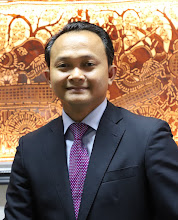Khmer Times, Opinion, 2 July 2024 (Link)
Looking back in history, in the 1990s-2000s, for Cambodia and Japan bilateral relations, discussion used to focus on the Official Development Assistance (ODA); we talked a lot about grant, loans; and observers of Cambodia-Japan relations should be familiar with the so-called Consultative Group (CG) Meeting for Cambodia held at the Council for the Development of Cambodia (CDC) to decide how much amount of ODA Cambodia should receive.
Starting from late 2000s, the topics of discussion began to gradually shift to trade, business and investment. In the early 2000s, the amount of bilateral trade was equivalent to the total amount of ODA, including loans, that Cambodia received from Japan. The Agreement for the Liberalisation, Promotion and Protection of Investment was signed in October 2007 between then Cambodian Prime Minister Samdech Techo Hun Sen and the late former Japanese Prime Minister Shinzo Abe. Based on this agreement, the Cambodia-Japan Joint Committee Meeting was established in 2009 to discuss and address concerns raised by Japanese investors in Cambodia.
In the early 2010s, when there were factors pushing for diversification of Japan’s supply chain in East and Southeast Asia, we saw a very small number of daring Japanese companies like Minebea and AEON who were willing to bet on Cambodia while the majority of Japanese companies were looking at some other countries as their frontier markets.
These two companies have built their business bases in Cambodia since early time, and the fact that they have been expanding their businesses speaks loud and clear about the dynamic business opportunities of Cambodia both in terms of production and supply chain as well as consumption market. In short, these two companies have enjoyed considerable first-mover advantages thank to their confidence in Cambodia’s business climate.
The two countries upgraded their ties to Strategic Partnership in 2013.
In 2015, we saw the completion of Neak Loeung Bridge or Tsubasa Bridge; we talked about how we can eliminate the bottleneck of the Southern Economic Corridor for the Greater Mekong Subregion as well as ASEAN. In fact, Tsubasa bridge has a larger significance beyond Cambodia, to the Mekong and ASEAN.
Slowly and gradually, Cambodia has become an important part of the larger Japan’s strategy for the Mekong and ASEAN.
And that is not limited to the discussion about economic and investment strategies or the establishment of Japan’s supply chain in ASEAN but it goes also to the level of political and security spectrum.
More importantly, we have observed that the dialogue has become increasingly two-way, not just Cambodia being passive without any role to play in the bilateral relations that are closely tied with regional political and economic landscape.
We have seen the two countries begin to exchange views on regional and international issues.
Beyond the exchange of views, we also saw how the two countries advanced joint concrete actions for the sake of regional peace, stability and prosperity.
For example, Cambodia and Japan have discussed, through official and unofficial channels, how the region can find solutions to bring Myanmar back to normalcy.
We discussed how we could provide humanitarian assistance to Ukraine through mine clearance.
We discussed how Cambodia and Japan can work together in peacekeeping cooperation.
Looking far back to the 1990s, who would have thought that Japan would choose a partnership with Cambodia to discuss and take joint actions on the issues of Myanmar and Ukraine?
No one expected this to happen, and yet both countries took concrete steps in the interest of regional and global peace. Indeed, these discussions began when Cambodia chaired ASEAN in 2022, but our cooperation on these issues continues until today.
It is therefore fair to say that the above expanded dynamism of bilateral cooperation resulted in the creation of the Comprehensive Strategic Partnership between the two countries in 2023.
We are now talking more about how our two nations can continue to promote our “peace-branding” regionally and globally.
In the future, as Japanese society ages and Cambodia moves toward an upper-middle-income economy in 2030 and a high-income economy in 2050, future discussions will focus on how Cambodia can contribute to the solution of Japan’s problems and vice versa.
We could one day establish a Cambodia-Japan free trade agreement; or we can set up and facilitate visa-free travel for Cambodian and Japanese tourists.
Among many other areas of cooperation, we are probably thinking more about how we can promote Cambodia’s role within Japan’s production and supply chain in Southeast Asia? How can Cambodia become Japan’s logistics hub in the Mekong region? How can Cambodia and Japan become strong trading partners, bilaterally and multilaterally? How can Cambodian Oknhas purchase Japanese technologies to drive innovation and build a stronger industrial base? How can Cambodia and Japan build regional infrastructure for the digital economy?
The above discussion has shed light on the evolution of relations between Cambodia and Japan over the past 30 years, after Japan reopened her embassy in 1992.
From purely one-sided dialogue relations characterized by grant, donation, and rehabilitation, to two-way economic partners characterized by increased trade, investment, and tourism, and to even two-ways dialogue and up to three-dimensional discussions about the Mekong and ASEAN, and even about peace issues in countries in faraway continents, the horizon for growth is vast for Cambodia-Japan bilateral relations that can contribute to regional and global peace, security and sustainable economic development.
So this is a long journey that we have traveled together, and we have to recognize Japan’s significance role in the early stage of Cambodia’s peacebuilding and the building of Cambodia’s self-confidence in terms of socio-economic development and institutional capacity.
For this we owe our gratitude to Japan.












